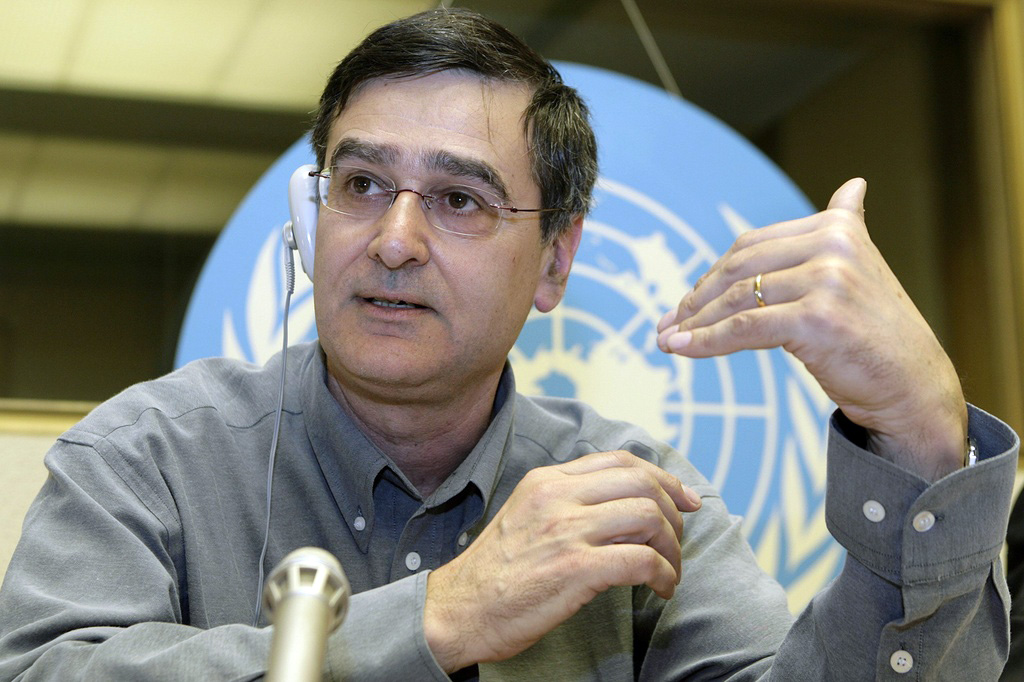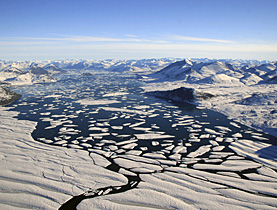“Vital climate decisions must not be delayed”

The timing of recent attempts to cast doubt over global warming is not accidental, according to top climatologist Martin Beniston.
The former vice-president of the Intergovernmental Panel on Climate Change (IPCC) and now professor at Geneva University, says 2010 is a pivotal year and climate decisions must not be put off.
Beniston is set to contribute a couple of chapters to the panel’s fifth report, expected in four years.
But a steady drip of small errors in a series of reports put out by the Nobel peace prize-winning IPCC on global warming is threatening to erode public confidence.
It was recently revealed that the 2007 report claimed there was a very high probability that the glaciers in the Himalayas would disappear by 2035, hundreds of years earlier than other information suggests. The writers now claim they meant to write 2350, but this has yet to be corrected.
Nevertheless, the overwhelming majority of scientists argue that the bulk of the reports are sound and that the physics of a warming atmosphere and rising seas is man-made and incontrovertible.
swissinfo.ch: The Himalaya mistake is shocking, isn’t it?
Martin Beniston: To find one or two mistakes in a document of three or four thousand pages is normal. Perhaps there are others. The question is whether the mistake was not corrected on purpose. If that’s the case, it’s serious. If not, I wouldn’t make a big deal of it. When you are doing the lay-out of the pages of these reports, you’re bombarded by all sorts of emails with this or that correction which can easily fall through the gaps.
swissinfo.ch: But can people still trust the IPCC?
M.B.: The basis of the IPCC conclusions has remained the same for the past 20, 25 years: human activity, throwing more and more greenhouse gases into the atmosphere, is disrupting the climate. The details can certainly be fine-tuned, but the basis is completely correct.
There are differences in the reports [of the three working groups]. The science report [Group I], which looked at the climate as a physical part of the earth’s system, is totally reliable. That report provides evidence for a link between human activity, greenhouse gas and climate disturbance.
The other reports deal with impact and mitigation. On impact the science is less advanced, and certain mistakes or speculation can creep into the reports of Groups II and III.
swissinfo.ch: How does the IPCC work?
M.B.: The governments name their scientists on the advice of universities and science academies. The IPCC works on two levels: the scientists themselves prepare the reports, using the latest data in the scientific literature on various aspects of the climate. This information is grouped in sectional chapters.
These chapters are then circulated first among scientific peers, who review and correct them, and then at a government level, for a second review, notably for political positions which could ensue from the way this information is brought out.
These reports are among the most reviewed in the world. The specialist articles in [scientific journals] Nature or Science don’t pass through such a rigorous series of evaluations. The Himalayan glaciers mistake slipped through this very long proof-reading process, which places great weight on attention to detail.
swissinfo.ch: Factual mistakes, criticism of the review process and pot-shots at the IPCC chairman – why is all this happening now?
M.B.: The chipping away began just before the conference in Copenhagen [in December] with the stealing of the British emails [from a university climate centre]. That got me thinking. Given the lack of a firm decision in Copenhagen, 2010 is the pivotal year for negotiating a follow-up for the Kyoto Protocol. After 2010 things will be a lot more difficult.
For a year or two we’ve seen little attacks intended to instil doubt in politicians more or less convinced of the reality of climate change, to get them to take a step backwards and not take a stand – that would be a good result for certain industries and lobbies.
In an in-depth article, British newspaper The Independent recently cited companies such as [oil and gas corporation] Exxon as being behind the leaks and calling the IPCC into question.
The mistake emerged three years after the publication of the report, during a critical year. That’s not a coincidence.
swissinfo.ch: In Nature, five scientists who contributed to the reports proposed their own visions for the IPCC. Some could actually see it disappearing. What do you think?
M.B.: The IPCC is a very heavy machine – but a unique one that acts as an interface between science and politics. It has played this unifying role to mobilise scientists and make decision-makers aware of issues which are far from insignificant.
But at this stage, the focal point of all the information is the science. When the fourth report came out in 2007, I seriously asked myself whether there was a need for a fifth, planned for 2013-14. There’s an inertia in the system that prevents people from freeing themselves of the obligation to keep going.
One or more new structures – more flexible and more focused on still unresolved issues [for example the effect of melting glaciers on the division of water resources] – would perhaps be a good thing. We no longer really need this heavy machinery re-taking global stock of the climate at a global level.
But I am open to any solution while this pressure continues on public opinion and decision-makers to try to make them give up. We were so close to reaching an agreement in Copenhagen. The more we delay taking essential decisions, the harder it will be to cope with the impact of global warming.
Pierre-François Besson, swissinfo.ch (Adapted from French by Thomas Stephens)
It’s been a dismal winter for climate scientists after the high point of winning the 2007 Nobel, along with former Vice President Al Gore, for championing efforts to curb global warming and documenting its effects.
In November, stolen private emails from a British university climate centre embarrassed a number of scientists for their efforts to stonewall climate sceptics.
In December, the much anticipated climate summit of world leaders in Copenhagen failed to produce a meaningful mandatory agreement to curb greenhouse gases.
Climate legislation in the US, considered key to any significant progress in slowing global warming, is stalled.
Some Republican US senators, climate sceptics and British newspapers have called for Rajendra Pachauri, chairman of the IPCC, to resign. They contend he has financial conflicts of interest involving his role with the climate panel and a green-energy foundation he set up. He has vigorously denied any conflicts.
Intergovernmental Panel on Climate Change (IPCC) figures suggest that to have a reasonable chance of avoiding 2°C of warming, global emissions would need to peak and start to decline within about 15-20 years.
The IPCC says industrialised countries should reduce their emissions by 25%-40% by 2020 compared with 1990 levels. It urges rich nations to reduce greenhouse gases by 85% by 2050 and developing countries to reduce their emissions by 50%.
The Swiss government proposes a 20% reduction by 2020 compared with 1990 levels. It says it is ready to raise the objective to 30%, depending on the outcome of the Copenhagen talks.
The work of the IPCC is often portrayed as one massive tome but in fact it is four separate assessment reports on different aspects of global warming (published in 1990, 1995, 2001 and 2007) written months apart by distinct groups of scientists.
Each assessment report is in three volumes, corresponding to Working Groups I, II and III. “The IPCC report” is often used to mean the Working Group I report, which covers the basic science of climate change.

In compliance with the JTI standards
More: SWI swissinfo.ch certified by the Journalism Trust Initiative













You can find an overview of ongoing debates with our journalists here . Please join us!
If you want to start a conversation about a topic raised in this article or want to report factual errors, email us at english@swissinfo.ch.